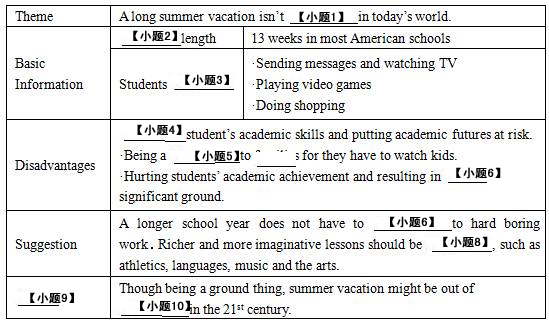题目内容
Frederick M.Hess is the director of education policy studies at the American Enterprise Institute, which is a nonprofit organization that conducts research on many public issues.He says that a long summer vacation doesn’t make sense in today’s world.
Can American students afford to take a summer vacation? In a summer vacation, millions of kids spend valuable time sending messages, watching TV, playing video games and doing shopping in the mall.They will also be putting their academic futures at risk.
Summer vacation once made sense in the past when you didn’t need an education to get a good job.But now things have changed.For today’s students, academic skills are important to students’ future success, but such skills are affected in the summertime.Many nations don’t give kids an American-style summer vacation.They offer no more than seven consecutive(连续的) weeks of vacation.Most American school districts offer up to thirteen weeks.To compete in the global marketplace, Americans must be prepared to go up against international competitors.
Summer vacation also causes challenges for today’s families.In the 1960s, more than 60% of families had a stay-at-home Mom.Now two-thirds of American children live in households where every adult works.For these families, summer vacation can be more burden than break.Someone must watch the kids.
But the biggest problem may be how summer vacation hurts academic achievement.Researchers have found that disadvantaged students lose significant ground in the summertime.
A longer school year does not have to be an invitation to hard boring work.Rather, it should allow time-pressed teachers to conduct richer and more imaginative lessons.Schools would have more time to devote to athletics, languages, music and the arts.Summer vacation can be a grand thing.But in the 21st century, it may also be outdated.
Title: Summer Vacation

 阅读快车系列答案
阅读快车系列答案
